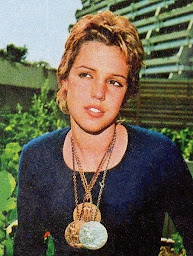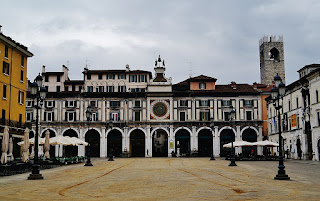The first Italian male swimmer to win a World championship gold
 |
| Giorgio Lamberti celebrates his gold medal victory |
Lamberti won 33 gold medals in the Italian swimming championships, six at the Mediterranean Games and three in the European championships, but the pinnacle of his career came in Perth in 1991, when he became the first Italian male to win a gold at the World championships.
In the 200m freestyle event, which was his speciality, he beat Germany’s Steffen Zesner by just under a second in a time of 1min 47.27 sec.
His success came almost two decades after Novella Calligaris had become the first Italian woman to win a World championship gold when she took the 800m freestyle title.
Lamberti was already a force in 200m freestyle, having two years earlier set a world record for the event of 1:46.69 in winning gold at the European championships in Bonn in 1989.
The record was to stand for 10 years, the longest stretch in the history of the 200m freestyle, until Australia’s Grant Hackett swam 1:46:67 in Brisbane.
 |
| Novella Calligaris was the first Italian to win a world title |
He showed natural ability in the pool and by his teenage years had developed much more strength. As a 16-year-old he joined the Leonessa Nuoto club in Brescia, where he was coached by Pietro Santi, who entered him for the European youth championships, where he won two medals.
After Santi left, Lamberti was taken under the wing of a new coach, Alberto Castagnetti, who would be his mentor for the rest of his career. At 17, in 1986, he won the first of his Italian championships, reaching the B final of the 200m freestyle of the World championships of the same year.
In 1988 it became clear that Lamberti was becoming a force to be reckoned with, setting world record times in both the 200m and 400m short course freestyle events, and the following year enjoyed triple gold medal success at the European championships in Bonn.
In addition to his world record performance in the 200m free, he also won gold in the 100m free and the four by 200m freestyle relay.
 |
| Lamberti's eldest son, Michele, is also a world champion |
He retired from competition in 1993 at the age of just 24, having struggled with shoulder problems. In 1998, he married Tanya Vannini, a teammate in the Italy national swimming team. They have three children, all of whom have followed them into the pool.
The eldest, 23-year-old Michele, is already a world champion, having won the 50m short course backstroke title in Abu Dhabi in December, and younger brother Matteo, who is based in Livorno and like his father is a freestyler, is seeking to emulate him. Their sister, Noemi, is still at high school but is also a regular swimmer.
Lamberti insists that he and his wife have not pushed them to swim competitively, despite their own pedigree, introducing them to the water at an early age only to help them stay safe in the sea on holiday.
Now 52 and a former city councillor in Brescia, Lamberti champions swimming in a different way, as a vocal advocate for the sport as a way for Italians of all ages to improve their health and wellbeing.
Despite suffering a serious bout of Covid-19 in March 2021, which put him in hospital and required many months of rehabilitation, he regularly campaigned for public swimming pools to be allowed to open with safety measures in place during Italy’s lockdown, rather than be closed completely, worried that the inability to access sports facilities would reverse the healthy habits adopted by many Italians and have consequences for the nation’s physical health long after the pandemic had passed.
Inducted to the Hall of Fame of international swimming in 2004, the second Italian swimmer to be afforded that honour after Novella Calligaris, Lamberti is a figure held in high esteem throughout the swimming world in Italy. For example, even though he is from Lombardy, swimmers for Team Veneto in regional competition wear a cap badge said to depict Lamberti in celebratory pose at the end of his world title-winning race.
 |
| The elegant Piazza della Loggia in Brescia, where the clock tower shows Venetian influence |
Brescia, where Giorgio Lamberti was born, tends not to attract many tourists compared with nearby Bergamo or Verona, yet is a city of artistic and architectural importance. Brescia became a Roman colony before the birth of Christ and you can see remains from the forum, theatre and a temple. The town came under the protection of Venice in the 15th century and there is a Venetian influence in the architecture of the Piazza della Loggia, an elegant square, which has a clock tower similar to the one in Saint Mark’s square. Next to the 17th century Duomo is an older cathedral, the unusually shaped Duomo Vecchio, also known as la Rotonda. The Santa Giulia Museo della Città, a museum that covers more than 3,000 years of Brescia’s history, is housed within the Benedictine Nunnery of San Salvatore and Santa Giulia in Via Musei.
 |
| A canal in Livorno's historic Venetian quarter, one of the attractions of the Tuscan city |
The port of Livorno, where Lamberti’s son, Matteo, trains, is the second largest city in Tuscany after Florence, with a population of almost 160,000. Although it is an important commercial port with much related industry, it has many attractions, including an elegant sea front – the Terrazza Mascagni - and the historic Venetian quarter, which has its own network of canals, and a tradition of serving excellent seafood. The Terrazza Mascagni is named after the composer Pietro Mascagni, famous for the opera Cavalleria rusticana, who was born in Livorno.
Also on this day:
1608: The birth of physiologist Giovanni Alfonso Borelli
1813: The birth of scientist Paolo Gorini
1978: The birth of record-breaking goalkeeper Gianluigi Buffon